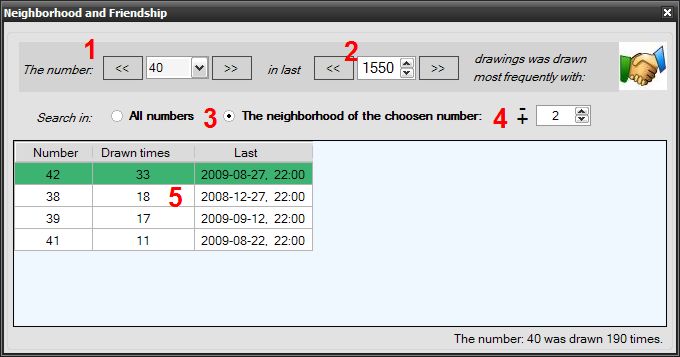|
|
 Neighborhood & Friendship Neighborhood & Friendship
This function (also mentioned in the
How to play?
section) identifies numbers that frequently come up together in draws.
Let’s have a look at a few consecutive lottery draw results from Washington Lotto:
- 2009-11-14 -> 5,7,8, 18, 30,32
- 2009-11-16 -> 4,6,8, 21, 32, 43
- 2009-11-18 -> 22, 28,29,31, 42,48
- 2009-11-21 -> 5, 9, 11, 22, 45,48
- 2009-11-23 -> 9,12,13, 21,22, 42
- 2009-11-25 -> 6,8, 14, 28, 42,43
- 2009-11-28 -> 11,13, 34, 38, 47,48
- 2009-11-30 -> 24, 30, 36,38,39, 44
- 2009-12-02 -> 5, 10, 26, 39,41,44
- 2009-12-05 -> 9, 15, 23, 35, 45,47
- 2009-12-07 -> 11, 20, 23,25, 29, 36
- 2009-12-09 -> 9, 18,19, 42, 47,48
- 2009-12-12 -> 6, 13,14, 18, 23, 37
- 2009-12-14 -> 21,22,23,25, 39, 45
There is an interesting tendency regarding proximity of the numbers (bold letters). You can
observe it in almost any range of draws you pick. The typical Lotto draw result (about 80% of them) looks like this: ..
two or three numbers very close to each other .. then long break .. and 2-3 again, also next
to each other.
We can summarize, that a given lottery drawing contains 2 or
3 subsets of ‘neighbors’, and that some numbers are 'friends' of some others (they
'like' to be drawn together).
For example:

1 - Select the number..
2 - .. and the number of draws
3 - In "Search in" select 'All numbers' if you want to look for "friends" (of number '40' in our example)
(in the whole group, or click "the neighborhood.." to search only among the nearest neighbors
(+/- 2 numbers)
4 - The output table contains: 'Number' - can be neighbour, its drawn count and last time the number showed up
In the print screen above we notice that number 42 is really 'close friend'
(and a neighbour) of 40. And this observation (they were drawn together 33 times)
can be beneficial for us.
|